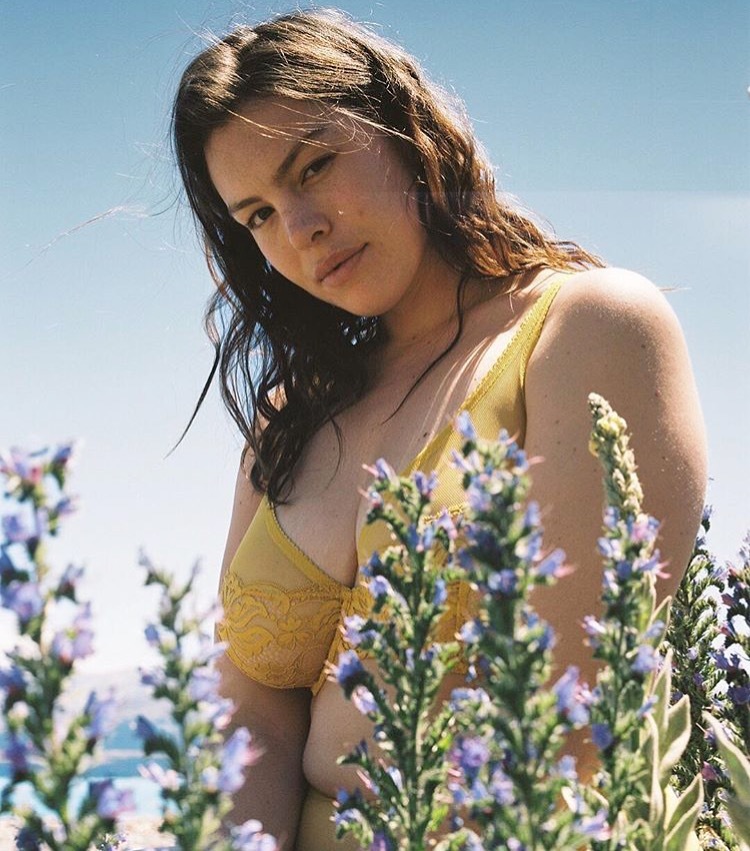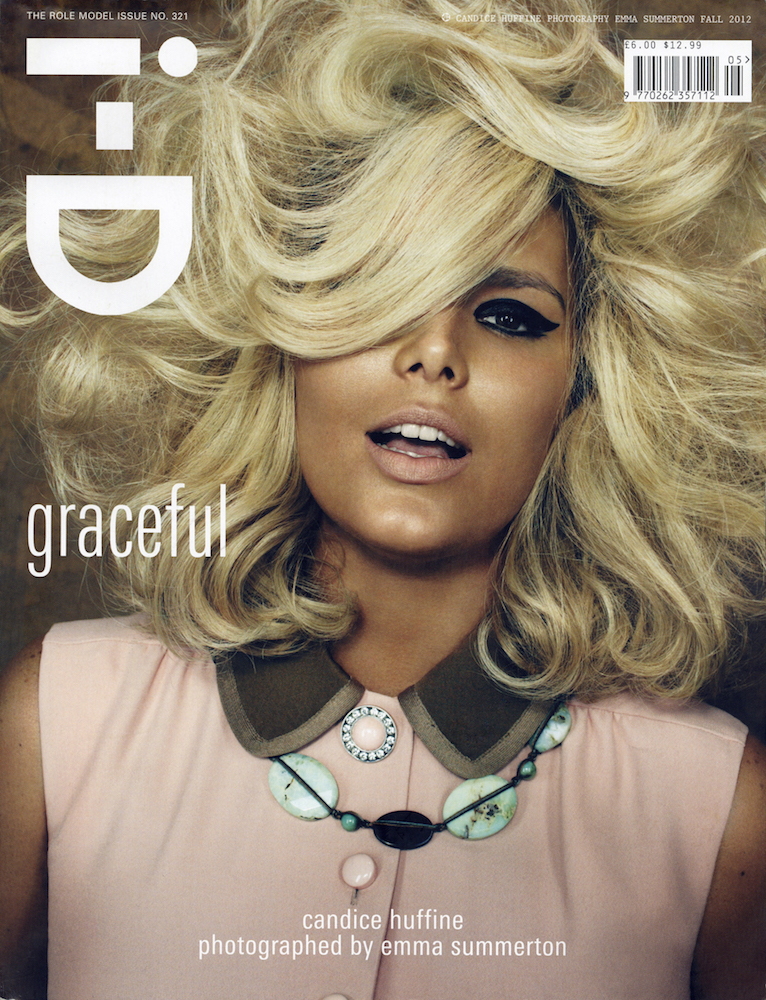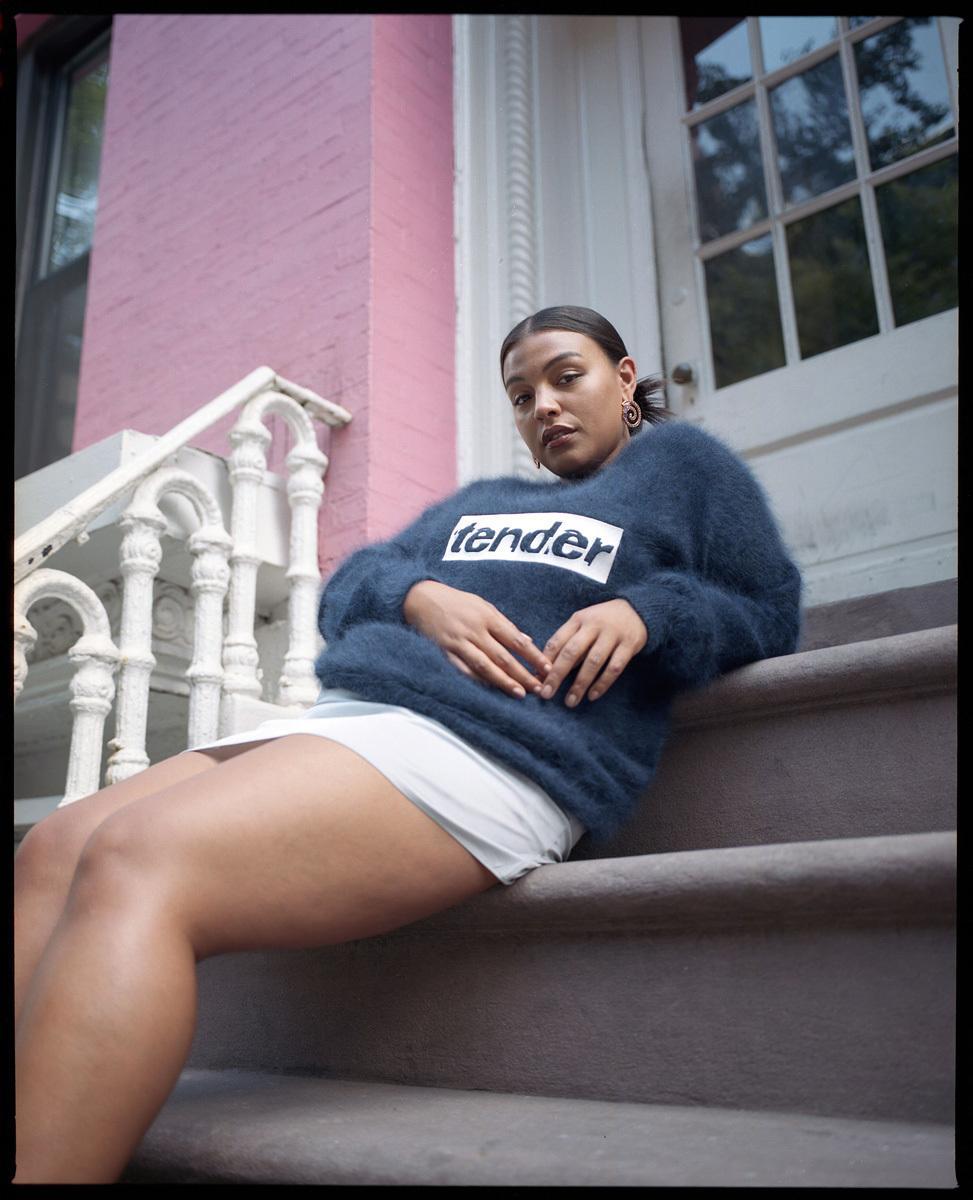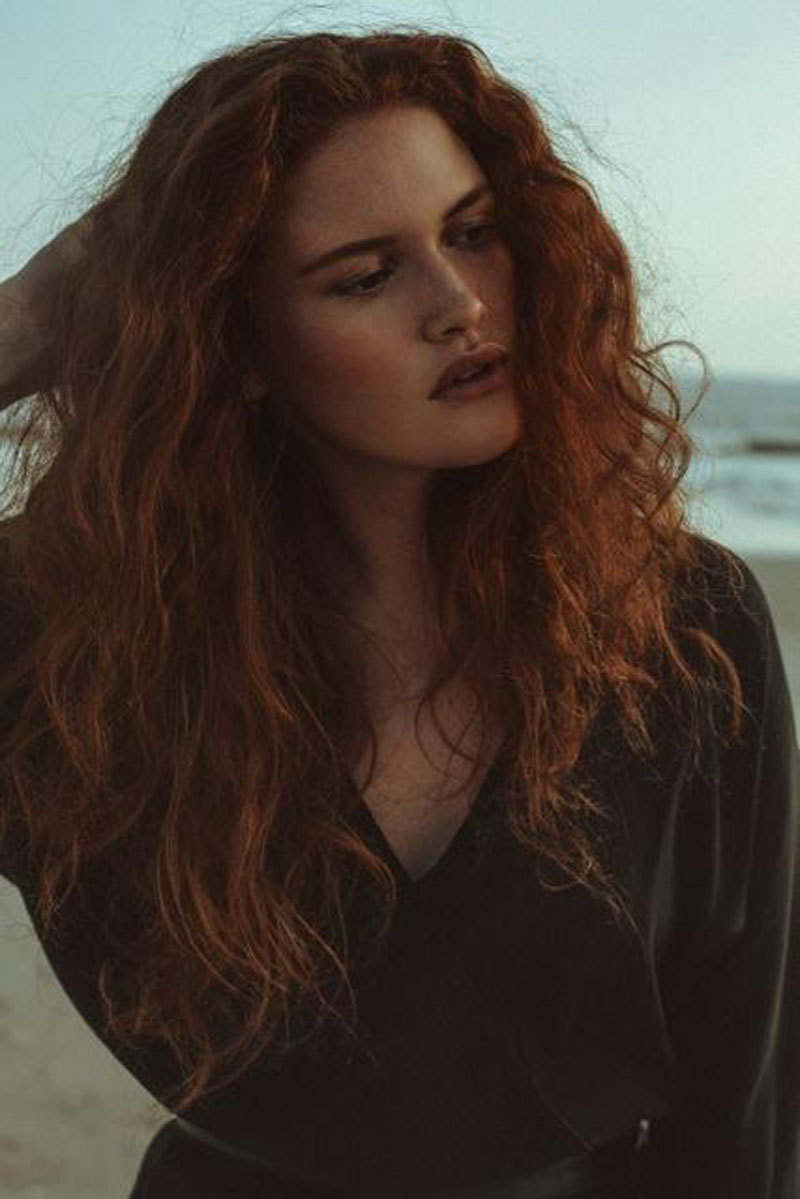Paloma Elsesser
Did you ever look up to a certain supermodel, or did you find your inspiration elsewhere?
I’m inspired by those who are authentically themselves. Artists like Kate Bush, activists like Angela Davis, authors like bell hooks. In reference to the curve industry, I’ve always looked to Crystal Renn and Sophie Dahl for inspiration. Crystal was a martyr and carved out a space for the size conversation in the days when we were silenced. She showed power and vulnerability in her movement and always stole the show, I find myself referencing her work constantly. I loved the age of the supermodel in the 80s and 90s, there was so much identity attached to each girl.
Is there still a stigma surrounding the term ‘plus-size’? Does the label act as a help or hindrance when securing work?
It acts as a lubricant in conversation when someone asks what it is that I do. It’s exhausting watching someone’s brow furrow into a question mark when I respond simply with, “I’m a model.” When I reply, “I’m a plus-size model,” their face normally lights up and they return with, “Oh! But of course. Look at that face!” I’m not really bothered by the label. If the term highlights our presence, so be it. If it kicks down the door for women to see bodies they relate to, so be it.
Does your experience of working in New York differ to other major fashion capitals?
I’ve had the most pleasant work experiences in New York and London. I believe they are cities that are incredibly receptive to newness. Open-mindedness is key. Some of the other fashion capitals are still bound to an incredibly archaic rules and are unwilling to take risks to integrate body diversity into the new fashion narrative.
What one thing would you change about the modeling industry?
I would encourage a more empathetic dialogue. Thick skin is important, but standing up for yourself is equally as important. It is okay to be tired, it is okay to not feel your best. I’m extremely sensitive and would like to think of myself as thoughtful, and I feel at times this industry can be void of those sentiments.
What would you advise to anyone wanting to start out in the modeling industry?
I would advise anyone trying to get into modeling to never lose your voice and authenticity. Know that you are worthy. Ally with brands and creatives who you admire and respect and those that make you feel supported.
Photography Lily Cummings
Katy Syme
Do you think the term ‘supermodel’ is dated? Is there a modern day equivalent?
I feel like I hear the term less these days, and when I do, I think we’re usually comparing to the 90s supers because they were just so iconic. Of course, there are equivalent successes now. Maybe you earn the ‘supermodel’ title when you no longer require a last name to identify yourself? The industry is constantly evolving, and now your worth relates to so much more than how many covers you’ve been on.
Who do you think is currently championing diversity, and why?
The last couple of seasons, we’ve seen an increase in the size, age, and racial diversity in the shows, but I think there’s still a way to go. It still feels to me like tokenism – we see one size 16 girl, and she’s wearing the black dress. I can’t understand why, if designers make the garment in a size, they aren’t sending it down the runway. H&M, DVF, and Tome have had resounding responses using a more diverse cast. There are aspirational women of every size, shape, and color. It would be amazing if we could start celebrating them all equally.
Do you think fashion has a social responsibility to challenge perceptions of beauty?
Fashion imagery is so readily available and consumed, we know it has a huge influence on people’s perception of what’s beautiful. As someone fabulous once said, “with great power comes great responsibility.” There are a million ways that fashion can create an aspirational image of beauty, and brand, while still being inclusive.
Does your experience modeling in NYC differ to elsewhere in the world?
The NYC hustle is real. Like nowhere else.
Is there a sense of community within the modelling world?
I’ve only ever worked as a plus-size model, and while the nature of the job can be lonely, I’ve met a million women on the job who are ready to empower and champion each other. Of course it’s competitive, but I truly feel connected to the people I work with.

Georgia Pratt
Did you ever look up to a certain supermodel, or did you find your inspiration elsewhere?
I don’t think there was ever one supermodel I liked or looked up to. The 90s supers always fascinated me, mainly because they were all you saw, but they always looked different. They were also a very diverse group of looks. They were interesting and you got a sense of their personalities.
Do you think the term ‘supermodel’ is dated?
It’s an easy way to describe somebody who is very successful, but it also doesn’t mean much beyond that to me. Every model now who is doing well has other projects and endeavors going on as well. So I think the ‘super’ bit can also refer to dynamic and clever women who have made a business model for themselves and their careers.
Have you ever experienced discrimination within the modeling industry?
Fortunately I can’t say that I have, but I know there are a lot of girls and guys who face this all the time – whether it’s regarding size, race, age. No matter how optimistic you are, you’re forced to accept that you can’t always have a mind-changing impact on every person you meet.
Do you think plus-size models are under-represented within the media?
In terms of the mainstream commercial advertising, there has definitely been an increase in the representation of all sizes, which is fantastic because that’s how it should be. When you jump into the fashion and editorial departments of the industry, I think models of larger sizes are still not getting seen enough.
How do we go about tackling stigmas surrounding size within the fashion system?
It’s so tricky because you almost have to ignore talking about it, and the right people just need to come on board and just show everyone it’s not as hard as it seems. It would be nice for some of fashion’s big names to show up and freshen up the scene.

Candice Huffine
Did you ever look up to a certain supermodel, or did you find your inspiration elsewhere?
When I was young my favorite supermodel was Laetitia Casta. I was always very confident in my body and shape, but remember seeing her curves as very comforting, like, “wow she’s hot, and you know what, so am I!” I didn’t look to models to become them, I looked to be inspired by them. That’s why it’s so important for all women to be represented in fashion and media – to feel empowered.
What do you think we’re missing within the modeling industry?
I think we are making incredible progress in seeing to it that nothing remains missing and no one goes unseen. Fashion looked the same for a very long time, and we’ve now shattered that. It’s onwards and upwards from here.
What is your biggest achievement?
My biggest achievement was 16 years ago – the day I signed my modeling contract. Modeling was my number one goal, all I ever talked about and all I ever wanted to be. I stood at a major crossroads back then when I was offered a contract with a contingency of losing 20 pounds first, or a contract as a plus-size model right then and there. I’m forever proud of my 15-year-old self for choosing the path that would get me where I am today. The one that allowed me to be myself through and through, navigate the industry on my terms, be a game-changer, and in the end, become a role model for other women learning to love and accept their bodies.
Describe a standard casting day in NYC.
Regular castings are quite sporadic for me, but during Fashion Week it was a whole new ballgame. Waiting, fitting, walking, getting called to come back to fittings, more waking. This past February was the first time I had been a part of show castings and I loved it! I can certainly attest that change is in the air. Not only did casting directors and designers see curvy models, they had clothing made and ready for us to try and booked us in their shows.
How do you feel about the term ‘plus-size’ within the modeling industry?
I have no problem with the word plus-size itself and have never found it offensive whatsoever, but within the fashion industry I think the term creates a giant hurdle to jump. If plus-size is to always precede my title as model, it constantly makes me and everything I have accomplished seem separate. This is a time of inclusion, we don’t need labels, you can see with your eyes that we are different and that is what is beautiful about us.
Credits
Text Greg French

